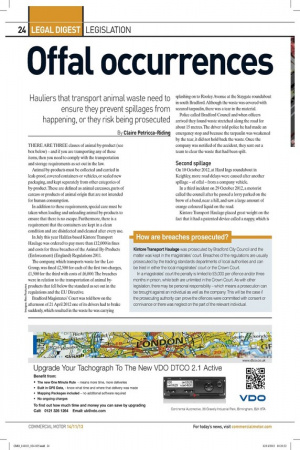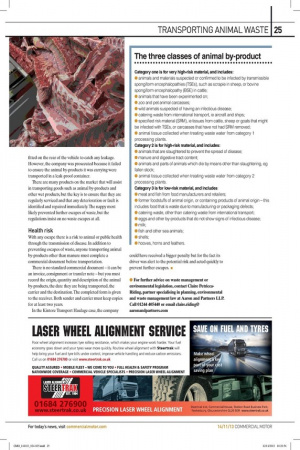Offal occurrences
Page 19

Page 20

If you've noticed an error in this article please click here to report it so we can fix it.
Hauliers that transport animal waste need to ensure they prevent spillages from happening, or they risk being prosecuted By Claire Petricca-Riding
THERE ARE THREE classes of animal by-product (see box below) — and if you are transporting any of these items, then you need to comply with the transportation and storage requirements as set out in the law.
Animal by-products must be collected and carried in leak-proof, covered containers or vehicles, or sealed new packaging, and kept separately from other categories of by-product. These are defined as animal carcasses, parts of carcass or products of animal origin that are not intended for human consumption.
In addition to these requirements, special care must be taken when loading and unloading animal by-products to ensure that there is no escape. Furthermore, there is a requirement that the containers are kept in a clean condition and are disinfected and cleaned after every use.
In July this year Halifax-based Kintore Transport Haulage was ordered to pay more than £12,000 in fines and costs for three breaches of the Animal By-Products (Enforcement) (England) Regulations 2011.
The company, which transports waste for the Leo Group, was fined £2,500 for each of the first two charges, £1,500 for the third with costs of £6,000. The breaches were in relation to the transportation of animal by'g products that fell below the standard as set out in the regulations and the EU Directive. Bradford Magistrates' Court was told how on the afternoon of 21 April 2012 one of its drivers had to brake 2 suddenly, which resulted in the waste he was carrying
splashing on to Rooley Avenue at the Staygate roundabout in south Bradford. Although the waste was covered with secured tarpaulin, there was a tear in the material.
Police called Bradford Council and when officers arrived they found waste stretched along the road for about 15 metres. The driver told police he had made an emergency stop and because the tarpaulin was weakened by the tear, it did not hold back the waste. Once the company was notified of the accident, they sent out a team to clear the waste that had been spilt. Second spillage
On 10 October 2012, at Hard Ings roundabout in Keighley, more road delays were caused after another spillage — of offal — from a company vehicle.
In a third incident on 29 October 2012, a motorist called the council after he passed a lorry parked on the brow of a bend, near a hill, and saw a large amount of orange coloured liquid on the road. Kintore Transport Haulage placed great weight on the fact that it had a patented device called a nappy, which is
fitted on the rear of the vehicle to catch any leakage. However, the company was prosecuted because it failed to ensure the animal by-products it was carrying were transported in a leak-proof container.
There are many products on the market that will assist in transporting goods such as animal by-products and other wet products, but the key is to ensure that they are regularly serviced and that any deterioration or fault is identified and repaired immediately. The nappy most likely prevented further escapes of waste, but the regulations insist on no waste escapes at all. Health risk
With any escape there is a risk to animal or public health through the transmission of disease. In addition to preventing escapes of waste, anyone transporting animal by-products other than manure must complete a commercial document before transportation.
There is no standard commercial document — it can be an invoice, consignment or transfer note — but you must record the origin, quantity and description of the animal by-products, the date they are being transported, the carrier and the destination. The completed form is given to the receiver. Both sender and carrier must keep copies for at least two years. In the Kintore Transport Haulage case, the company could have received a bigger penalty but for the fact its driver was alert to the potential risk and acted quickly to prevent further escapes. • • For further advice on waste management or environmental legislation, contact Claire PetriccaRiding, partner specialising in planning, environmental and waste management law at Aaron and Partners LLP. Call 01244 405440 or email clairesiding@ aaronandpartners.com








































